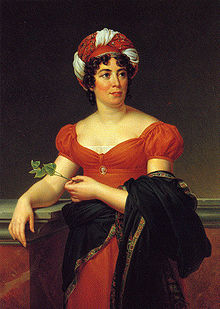Anne Louise Germaine de Staël
| Germaine de Staël | |
|---|---|

Madame de Staël by François Gérard (1810)
|
|
| Born |
Anne-Louise Germaine Necker 22 April 1766 Paris, France |
| Died | 14 July 1817 (aged 51) Paris, France |
| Cause of death | Cerebral hemorrhage |
| Nationality | French |
| Notable work | Delphine (1802) |
| Spouse(s) |
Erik Magnus Staël von Holstein (m. 1786–1802); his death Albert Jean Michel de Rocca (m. 1811–17); her death |
| Era | 19th-century |
| Region | Western philosophy |
| School | Romanticism |
|
Main interests
|
Politics, monarchism, nationalism |
|
Notable ideas
|
Literary salons |
Anne Louise Germaine de Staël-Holstein (French: [stal]; 22 April 1766 – 14 July 1817), commonly known as Madame de Staël, was a French woman of letters of Swiss origin whose lifetime overlapped with the events of the French Revolution and the Napoleonic era. She was one of Napoleon's principal opponents. Celebrated for her conversational eloquence, she participated actively in the political and intellectual life of her times. Her works, both critical and fictional, made their mark on the history of European Romanticism.
Anne Louise Germaine Necker was born in Paris, France. Her father was the prominent Swiss banker and statesman Jacques Necker, who was the Director-General of Finance under King Louis XVI of France. Her mother was Suzanne Curchod, also of Swiss birth, who hosted one of the most popular salons of Paris. Figures such as the Comte de Buffon, Jean-François Marmontel, Melchior Grimm, Edward Gibbon, the Abbé Raynal, and Jean-François de la Harpe were frequent guests. Mme Necker wanted to educate her daughter according to the principles of Jean-Jacques Rousseau and to endow her with the intellectual education and Calvinist discipline instilled in her by her own Protestant pastor father. She habitually brought Germaine as a young child to sit at her feet in her salon, where the sober intellectuals took pleasure in stimulating the brilliant child. This exposure occasioned a breakdown in adolescence, but the seeds of a literary vocation had been sown irrevocably.
...
Wikipedia
